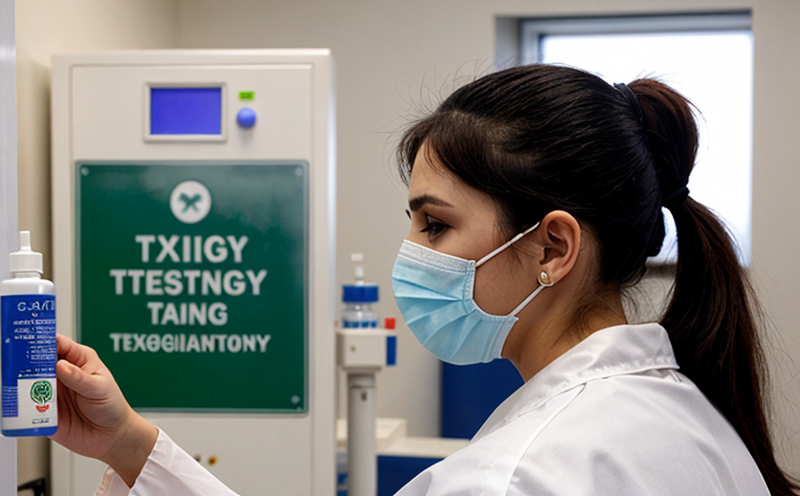Species Specific Toxicology Testing
In the realm of pharmaceutical testing, species-specific toxicology testing stands as a critical pillar ensuring the safety and efficacy of new drug candidates. This form of testing is designed to evaluate the potential adverse effects that a chemical or compound might have on various animal models before they reach human subjects during clinical trials.
The importance of this service cannot be overstated, especially in light of recent regulatory changes aimed at reducing the reliance on animal testing while ensuring robust safety data. Species-specific toxicology tests allow for a more targeted and accurate assessment of toxicity profiles across different species, thereby bridging gaps that traditional methods might not capture.
The process begins with selecting appropriate animal models based on historical data, metabolic pathways, and physiological characteristics relevant to the compound under investigation. For instance, when testing a cardiovascular drug, researchers would choose rodent models due to their similar heart structure and function. However, for neurotoxic compounds, primate models may be more suitable as they share closer genetic and neurological similarities with humans.
Once the model is selected, meticulous specimen preparation ensures that each test batch adheres strictly to predefined protocols. This involves not only collecting biopsies but also maintaining strict environmental conditions throughout the experiment to avoid external variables influencing results. Advanced instrumentation plays a crucial role here; high-resolution imaging systems and mass spectrometers are employed to analyze tissue samples at both macroscopic and microscopic levels.
The outcome of these tests is then meticulously reported using internationally recognized standards such as ISO 10993-22, which specifies biocompatibility testing methods. These reports serve as vital documents guiding further development stages or regulatory approvals. It’s worth noting that while species-specific testing provides valuable insights into potential risks, it also helps in optimizing drug formulations to minimize undesirable side effects.
- ISO 10993-22: Biocompatibility Testing
- ASTM E1658: Guideline for Designing and Conducting Preclinical Toxicology Studies
- IEC TS 62792: Guidelines on Safety and Performance Testing of Medical Devices
The comprehensive nature of species-specific toxicology testing underscores its significance in advancing pharmaceutical research while maintaining stringent ethical standards. By leveraging cutting-edge technology and rigorous methodologies, this service offers unparalleled accuracy and reliability, setting the standard for future innovations.
Why It Matters
The necessity of species-specific toxicology testing lies in its ability to provide detailed insights into how different organisms respond to a particular substance. Understanding these responses is crucial not only from an ethical standpoint but also for ensuring public health and safety.
For instance, certain compounds may pose minimal risk when tested on mice or rats but could exhibit entirely different behaviors when administered to primates or rabbits. This variability highlights the importance of conducting species-specific tests early in the drug discovery process rather than waiting until late stages where changes can be costly and time-consuming.
Moreover, these tests play a pivotal role in reducing unnecessary animal use by identifying suitable models upfront. By streamlining the initial screening phase through targeted species-specific assessments, pharmaceutical companies can significantly lower overall costs associated with extensive testing later on.
In essence, species-specific toxicology testing serves as a bridge between basic research and clinical application, providing essential data that informs decision-making throughout drug development pipelines. Its relevance extends beyond mere compliance; it represents an investment in advancing medical science responsibly.
Why Choose This Test
Selecting species-specific toxicology testing for your project offers several compelling advantages over conventional approaches. Firstly, it provides more precise and reliable data tailored specifically to the intended target population—be it humans or other relevant animal models.
A key advantage of this service is its ability to identify potential issues early in the development cycle. By detecting adverse effects during preclinical stages, companies can address safety concerns proactively, avoiding costly delays and failures later on. Additionally, species-specific tests offer greater relevance compared to generic alternatives since they account for interspecies differences that could impact outcome interpretations.
From a practical perspective, this service supports regulatory compliance by ensuring adherence to stringent guidelines like those outlined in ISO 10993-22 and ASTM E1658. Furthermore, it fosters innovation within the industry by encouraging the exploration of novel methodologies and technologies that enhance accuracy without compromising ethical considerations.
Ultimately, choosing species-specific toxicology testing demonstrates a commitment to quality, safety, and responsible scientific practice—a value proposition that resonates strongly with modern pharmaceutical stakeholders.
International Acceptance and Recognition
- ISO 10993-22: International Organization for Standardization’s guideline on biocompatibility testing, widely accepted globally.
- ASTM E1658: American Society for Testing and Materials’ standard practice for designing and conducting preclinical toxicology studies, recognized worldwide.
- IEC TS 62792: International Electrotechnical Commission’s technical specification on safety and performance testing of medical devices, gaining traction internationally.
Species-specific toxicology tests are increasingly embraced by regulatory bodies across the globe. In Europe, for example, the European Medicines Agency (EMA) encourages the use of such tests to ensure robust preclinical data supporting clinical trial applications. Similarly, in North America, the Food and Drug Administration (FDA) mandates certain species-specific evaluations as part of its approval processes.
The growing acceptance of these tests reflects a broader trend towards more sophisticated and ethically sound approaches in pharmaceutical research. By aligning with international standards, companies not only enhance their competitive positioning but also contribute positively to the advancement of science and healthcare worldwide.





